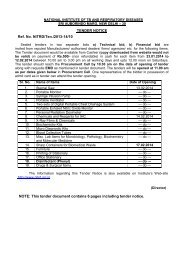The Indian Journal of Tuberculosis - LRS Institute of Tuberculosis ...
The Indian Journal of Tuberculosis - LRS Institute of Tuberculosis ...
The Indian Journal of Tuberculosis - LRS Institute of Tuberculosis ...
Create successful ePaper yourself
Turn your PDF publications into a flip-book with our unique Google optimized e-Paper software.
INFLUENCE OF DRUG SUSCEPTIBILITY ON TREATMENT OUTCOME 147<br />
patients had susceptible organisms and MDR-TB was<br />
observed only in 4% <strong>of</strong> cases. In a retrospective<br />
study Gninafon et al 17 , from Cotonou, Benin, has<br />
reported satisfactory and comparable success rates<br />
among re-treatment patients (78%) and new cases<br />
(82%). <strong>The</strong> success rate was similar among relapses<br />
(80%) and failures (85%). <strong>The</strong> failure rate for all retreatment<br />
patients was low (3%). <strong>The</strong> reasons<br />
attributed for the excellent results by the authors were<br />
the low rate <strong>of</strong> both primary (0.3%) and secondary<br />
(11%) multi-drug-resistance and Rifampicin was<br />
given only under strict supervision. Response to the<br />
WHO-recommended re-treatment regimen varies<br />
great deal between countries, depending on the<br />
prevalence <strong>of</strong> drug resistance among these patients<br />
and the quality <strong>of</strong> TB control.<br />
Treatment compliance is the most crucial<br />
factor for the successful outcome <strong>of</strong> any effective<br />
regimen. Default was significantly more among male<br />
patients, alcoholics and smokers. <strong>The</strong>se groups <strong>of</strong><br />
patients need to be targeted with additional health<br />
education and intensive counselling and supervision.<br />
In TB cases with MDR-TB the standard<br />
retreatment regimen result in unacceptably high failure<br />
rates 12 and for all other drug resistant forms <strong>of</strong> TB,<br />
Rifampicin-based short course chemotherapy gives<br />
satisfactory results 18 . This study also shows that the<br />
RNTCP policy in India <strong>of</strong> treating all re-treatment<br />
cases with the WHO recommended re-treatment<br />
regimen may be adequate except for the MDR-TB<br />
patients. DST should be done for patients who<br />
remain sputum smear positive during the retreatment<br />
period and appropriate regimens should<br />
be started as early as possible for better treatment<br />
outcome and to reduce transmission <strong>of</strong> drug<br />
resistant TB. Of the patients who remained sputum<br />
smear-positive at the end <strong>of</strong> 3 and 4 months <strong>of</strong><br />
treatment, 23% and 41% respectively had MDR-TB.<br />
Among the patients who failed to CAT-II regimen, 32%<br />
had MDR-TB. <strong>The</strong> limitations <strong>of</strong> this report are high<br />
default rate and DST could not be done for a significant<br />
number <strong>of</strong> cases who remained smear positive during<br />
treatment. However, the initial drug susceptibility pr<strong>of</strong>ile<br />
was similar among patients for whom sputum was<br />
not collected to those from whom sputum was<br />
collected. <strong>The</strong> results are from a localized area and<br />
need to be confirmed from other areas as well.<br />
CONCLUSION<br />
<strong>The</strong> low success rate to the CAT-II<br />
regimen was mainly due to the high default<br />
during treatment. If treatment compliance can<br />
be ensured for all patients majority <strong>of</strong> patients<br />
registered to CAT-II regimen can have a<br />
successful treatment outcome. Development <strong>of</strong><br />
resistance to Rifampicin observed among failures<br />
to CAT II regimen was low. A high proportion <strong>of</strong><br />
patients who failed to CAT-II regimen had either<br />
susceptible or resistant but non-MDR bacilli. <strong>The</strong><br />
high default rate observed in the study area<br />
suggests the need for enhanced counselling and<br />
supervision with targeted health education.<br />
ACKNOWLEDGEMENTS<br />
<strong>The</strong> authors are grateful to Pr<strong>of</strong>essor N.K.<br />
Ganguly, the Director General <strong>of</strong> the <strong>Indian</strong> Council<br />
<strong>of</strong> Medical Research for his encouragement and<br />
support. <strong>The</strong> authors acknowledge the efforts <strong>of</strong> Mr.<br />
Arjunan, P. Narayanan, Abdul Kudoos, Acharya L.K.<br />
and Sasidharan and other field staff in assisting in<br />
sputum collection, and are extremely thankful to the<br />
staff <strong>of</strong> the Bacteriology department for reporting<br />
results promptly. <strong>The</strong> staff <strong>of</strong> EDP division is<br />
gratefully acknowledged for data entry and data<br />
management. We thank the state tuberculosis <strong>of</strong>ficer,<br />
Tamil Nadu and the district <strong>of</strong>ficials for permitting<br />
us to carry out the study.<br />
<strong>The</strong> analysis and presentation <strong>of</strong> the data<br />
was supported in part by the World Health<br />
Organization with financial assistance provided by<br />
the United States Agency for International<br />
Development under the Model DOTS Project.<br />
REFERENCES<br />
1. Khatri GR, Frieden TR Controlling tuberculosis in India.<br />
New Eng J Med 2002; 347: 1420-26.<br />
2. TB India 2004.RNTCP Status report. CentralTB Division,<br />
Directorate General <strong>of</strong> Health Services. Ministry <strong>of</strong> Health<br />
and FamilyWelfare, Nirman Bhavan, New Delhi – 110 011.<br />
3. Marcos A Espinal, World Health Organization, Geneva.<br />
Time to abandon the standard re-treatment regimen with<br />
first line drugs for failures <strong>of</strong> standard treatment. Editorial,<br />
<strong>Indian</strong> <strong>Journal</strong> <strong>of</strong> <strong>Tuberculosis</strong>
















